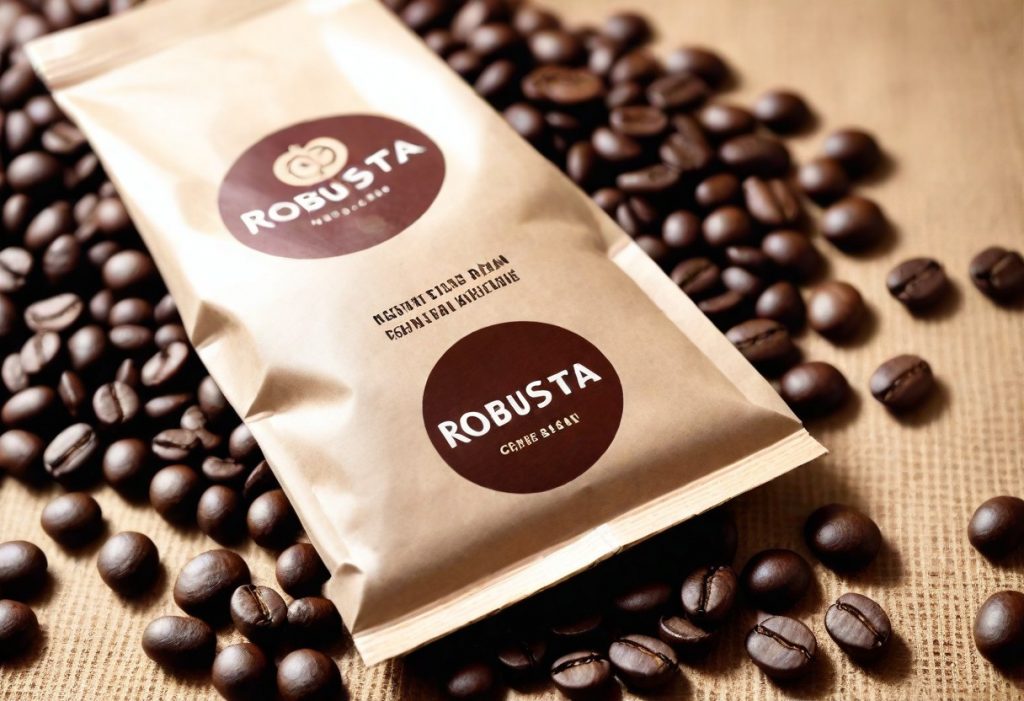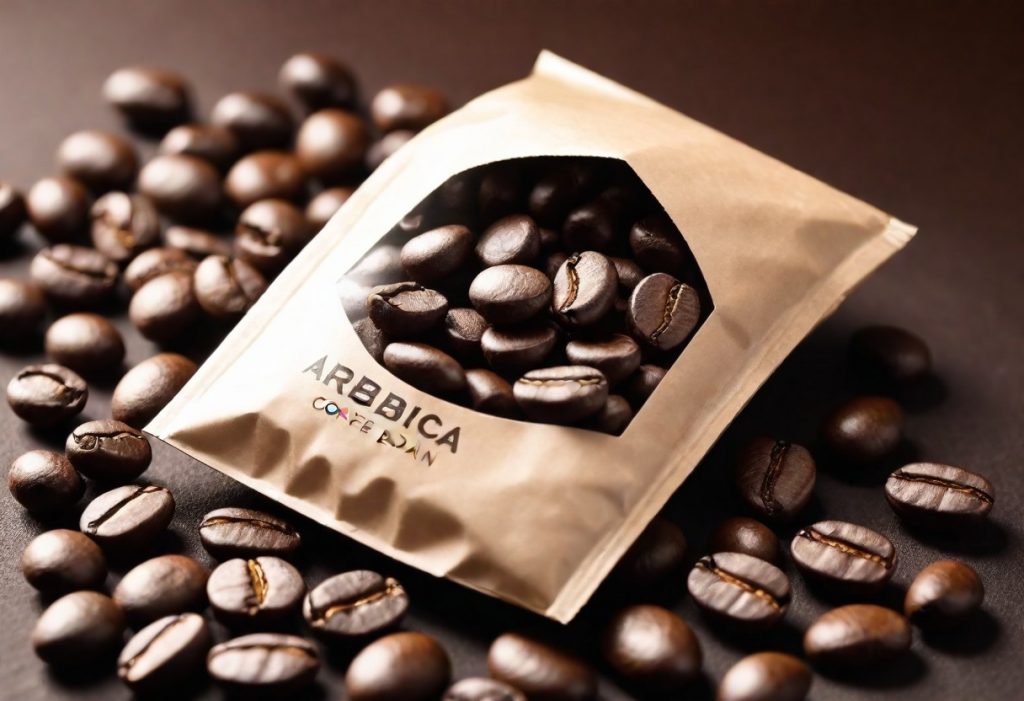Coffee, renowned for its captivating aroma that fills the air with warmth and its invigorating flavor that awakens the senses, has captivated the hearts and sparked lively conversations among people across continents for centuries. At the core of this enduring global phenomenon lie two primary species of coffee beans: Arabica and Robusta. Each of these species possesses a unique personality, imparting its distinctive nuances and flavors to every cup, thereby creating a rich tapestry of flavors that beckons coffee enthusiasts to embark on an exploration of taste and aroma. hey each have their own unique flavors that make every cup of coffee special. Let’s explore why people love these beans so much!
Robusta Coffee Bean

Robusta coffee beans (Coffea canephora) are often underestimated but play a crucial role in the world of coffee. Originating from regions with lower altitudes, Robusta beans are resilient and thrive in environments where Arabica beans struggle. Countries like Vietnam, Brazil, and Indonesia are major producers of Robusta coffee.
Robusta beans are known for their boldness. They possess a strong, earthy flavour profile with hints of bitterness that coffee aficionados appreciate. This robustness makes them an excellent choice for creating espresso blends, where their higher caffeine content contributes to the intensity of the brew.
One of the significant advantages of Robusta beans is their resistance to pests and diseases. This resilience translates to lower production costs and a more stable supply chain for coffee producers. Additionally, Robusta beans are often used in instant coffee production due to their ability to maintain flavor and aroma during processing.
Arabica Coffee Beans

Arabica coffee beans (Coffea arabica) are synonymous with specialty coffee and are considered the benchmark for quality in the coffee world. Originating from high-altitude regions such as Ethiopia, Colombia, and Kenya, Arabica beans thrive in cooler climates with well-defined rainy and dry seasons.
What sets Arabica beans apart is their complex flavour profile. They offer a diverse range of taste notes, including fruity undertones, floral aromas, nutty nuances, and hints of chocolate. This diversity is a result of the specific growing conditions and processing methods employed by coffee farmers.
Arabica beans are typically used in brewing methods that highlight their nuanced flavors. Pour-over, French press, and single-origin espresso are popular choices among coffee enthusiasts seeking to savor the intricate characteristics of Arabica coffee. Furthermore, Arabica beans have lower acidity levels compared to Robusta, making them a preferred option for individuals with sensitive stomachs.
The Benefits
Robusta Coffee Beans
1. Resilience and Sustainability
The resilience of Robusta beans makes them a dependable choice for coffee producers, especially in regions where environmental challenges are prevalent. Their ability to withstand pests and diseases reduces the need for pesticides and contributes to more sustainable coffee farming practices.
2. Higher Caffeine Content
Robusta beans contain approximately twice the amount of caffeine compared to Arabica beans. This higher caffeine content contributes to the boldness and energy-boosting properties of Robusta-based coffee beverages, making them popular choices for those seeking a strong and invigorating coffee experience.
3. Affordability and Accessibility
Due to their higher yield per plant and lower susceptibility to environmental stressors, Robusta beans are often more affordable than Arabica beans. This affordability makes Robusta coffee accessible to a wider range of consumers and supports the global coffee industry’s economic sustainability.
Arabica Coffee Beans
1. Quality and Complexity
Arabica beans are renowned for their quality and complexity, making them a staple in specialty coffee markets worldwide. The diverse flavour profile of Arabica coffee, ranging from fruity and floral to nutty and chocolaty, appeals to discerning coffee enthusiasts seeking unique taste experiences.
2. Lower Acidity and Smoothness
Compared to Robusta, Arabica coffee has lower acidity levels, resulting in a smoother and more balanced cup. This characteristic makes Arabica beans an ideal choice for individuals with sensitive stomachs or those who prefer a milder coffee flavour profile.
3. Premium Market Position
Arabica coffee occupies a premium position in the coffee market due to its quality, flavour complexity, and the craftsmanship involved in its cultivation and processing. Specialty coffee shops and roasters often showcase Arabica beans to highlight the diversity and richness of coffee culture.
The Way of Use
Robusta Coffee Beans
1. Espresso Blends and Dark Roasts
Robusta beans are commonly used in espresso blends to enhance crema and provide a strong base flavour. The higher caffeine content in Robusta contributes to the energy-boosting properties of espresso, making it a popular choice for morning rituals and quick pick-me-ups. Additionally, Robusta beans are suitable for dark roasts, accentuating their bold flavours and creating a robust coffee experience.
2. Instant Coffee Production
The robustness and flavour stability of Robusta beans make them ideal for instant coffee production. Their ability to withstand processing techniques while retaining their aroma and taste makes Robusta a preferred choice for instant coffee consumers looking for convenience without compromising on quality.
Arabica Coffee Beans
1. Specialty Brews and Single-Origin Espressos
Arabica beans shine in a variety of brewing methods that allow their nuanced flavours to shine. Pour-over brewing brings out the fruity and floral notes of Arabica coffee, creating a well-balanced and aromatic cup. French press brewing enhances the body and richness of Arabica coffee, appealing to those who enjoy a full-bodied coffee experience. Single-origin espresso made with Arabica beans showcases the terroir and craftsmanship behind each cup, offering a sensory journey for coffee enthusiasts.
Conclusion
In conclusion, Arabica and Robusta coffee beans offer a world of flavours and experiences waiting to be explored. From the boldness of Robusta to the complexity of Arabica, each bean brings its own unique character to the coffee cup. As coffee enthusiasts, we have the privilege of discovering and savouring these nuances, enriching our coffee rituals with every sip. Embrace the diversity of coffee culture, experiment with different brewing methods, and let the magic of Arabica and Robusta beans elevate your coffee journey. Cheers to the wonderful world of coffee!
FAQ
Why People Love Arabica and Robusta Coffee?
People love Arabica coffee because it’s smooth and has lots of different flavours. It’s like having a little adventure in every sip! On the other hand, people love Robusta coffee because it’s strong and gives you that kick of energy you need to start your day.
What are the different ways to enjoy Arabica and Robusta coffee?
There are so many ways to enjoy Arabica and Robusta coffee. For Arabica coffee, you can make it in a French press for a rich and flavourful cup. Or you can use it in a pour-over for a lighter and more delicate taste. Robusta coffee is perfect for making espresso because it adds that strong and bold flavour. You can also use it in a drip coffee maker for a quick and easy cup.
